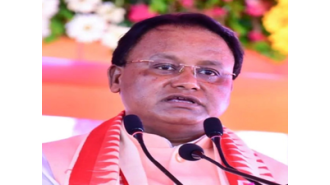Feeling lost and aimless, lacking a clear purpose or guidance.
Minority governments must focus on maintaining enough support to avoid no-confidence votes and successfully pass legislation, which often requires a strong coalition at the center.
September 8th 2024.

When it comes to running a government, minority governments have two major concerns that they must address. These concerns are not easy to navigate and require careful consideration in order to maintain stability and achieve their goals. The first concern is staying in office for the full term of five years, which can be a challenging task when the ruling party does not have a clear majority. This requires a sufficient number of MPs from the ruling party in order to keep the coalition together. In our country's history, we have seen that this number can be as low as 150 seats, but not much lower. For instance, in 1996, the coalition formed by the Janata Dal and the Communists, with two prime ministers, Deve Gowda and Inder Gujral, had only 78 seats. This was not enough to maintain stability and the government ultimately fell within two years, after facing much drama and relying heavily on external support from the Congress.
Despite the challenges of running a government with almost equal numbers of seats among the allies, it is possible to make it through the full term. In fact, all three coalitions that were in office before 2014 were able to survive for five years, with the first one even choosing to go into elections six months early. This is impressive, considering that the ruling party in these coalitions had as few as 182 seats, 145 seats, and 206 seats respectively. Of course, there were many reports and rumors of allies causing trouble and threatening to pull out, but in the end, all three coalitions managed to finish their terms.
In the current 18th Lok Sabha, the BJP holds the majority with 240 seats, making it the only party capable of forming a government. Although they may have lost their majority, they still have the power to remain in office for as long as they want. The BJP's allies are well aware of this fact and also understand that they will keep their ministerial positions until 2029. Therefore, they have no reason to defend the government except with their votes. This has resulted in a unique situation where the allies remain on the sidelines while the BJP deals with opposition from other parties.
This lack of investment in the BJP's ideology and lack of incentive to defend it on controversial issues has led to the second concern for coalition governments: passing legislation. With the assurance of a full term in office, the BJP may struggle to pass legislation, as seen in their recent u-turns on issues such as waqf and lateral entry. However, history has shown that passing legislation is not impossible for weak governments. For instance, the Singh 2004 coalition, which was the weakest of the three previous coalitions, was able to pass high-impact legislation, including laws on the Right to Information, NREGA, and the nuclear deal with the United States. Despite facing opposition from their allies, the coalition was able to push through these important laws. Similarly, Narasimha Rao, who had the same number of seats as Narendra Modi does today, was able to pass economic reforms during his term.
It is worth noting that strong governments often resort to questionable methods to pass laws, such as using the "money bill" loophole to avoid the Rajya Sabha. However, this will no longer be possible for the current Modi government, given their weak position in the Lok Sabha. So how will they proceed? The only option seems to be letting go of controversial issues, such as the uniform civil code and the national register of citizens, and focusing on more achievable goals. Like former Prime Minister Vajpayee, Modi may have to move away from Hindutva and adopt a different framework for governance and policy. However, this may not be easy without a clear vision, like the UPA had on citizen empowerment, or the first two Modi governments had on minority persecution. After being in power for two terms, it is natural for any leader to run out of grand ideas, as seen with leaders like Nehru and Tony Blair.
Media tycoon Rupert Murdoch once gave advice to former President Barack Obama before the 2008 election, saying that all presidents since Harry Truman were only able to push through reform in their first few months in office. This was when they had the motivation, energy, and goodwill to make a real impact. It is interesting to note that many of the key laws passed by Manmohan Singh, such as the Right to Information Act and the nuclear deal with the United States, were passed within the first few months of his term.
Today, even those who support Prime Minister Modi feel a sense of listlessness in his government. It is unclear what they are trying to achieve, as evidenced by their recent u-turns. These changes in direction are a result of the failure of old methods in the absence of a clear majority. Without new and inclusive ideas from Modi, the government will continue to drift without a clear goal. In the words of the British, the leader will be in office but unable to make a real impact, much like a sovereign monarch who is severely constrained in their power.
Despite the challenges of running a government with almost equal numbers of seats among the allies, it is possible to make it through the full term. In fact, all three coalitions that were in office before 2014 were able to survive for five years, with the first one even choosing to go into elections six months early. This is impressive, considering that the ruling party in these coalitions had as few as 182 seats, 145 seats, and 206 seats respectively. Of course, there were many reports and rumors of allies causing trouble and threatening to pull out, but in the end, all three coalitions managed to finish their terms.
In the current 18th Lok Sabha, the BJP holds the majority with 240 seats, making it the only party capable of forming a government. Although they may have lost their majority, they still have the power to remain in office for as long as they want. The BJP's allies are well aware of this fact and also understand that they will keep their ministerial positions until 2029. Therefore, they have no reason to defend the government except with their votes. This has resulted in a unique situation where the allies remain on the sidelines while the BJP deals with opposition from other parties.
This lack of investment in the BJP's ideology and lack of incentive to defend it on controversial issues has led to the second concern for coalition governments: passing legislation. With the assurance of a full term in office, the BJP may struggle to pass legislation, as seen in their recent u-turns on issues such as waqf and lateral entry. However, history has shown that passing legislation is not impossible for weak governments. For instance, the Singh 2004 coalition, which was the weakest of the three previous coalitions, was able to pass high-impact legislation, including laws on the Right to Information, NREGA, and the nuclear deal with the United States. Despite facing opposition from their allies, the coalition was able to push through these important laws. Similarly, Narasimha Rao, who had the same number of seats as Narendra Modi does today, was able to pass economic reforms during his term.
It is worth noting that strong governments often resort to questionable methods to pass laws, such as using the "money bill" loophole to avoid the Rajya Sabha. However, this will no longer be possible for the current Modi government, given their weak position in the Lok Sabha. So how will they proceed? The only option seems to be letting go of controversial issues, such as the uniform civil code and the national register of citizens, and focusing on more achievable goals. Like former Prime Minister Vajpayee, Modi may have to move away from Hindutva and adopt a different framework for governance and policy. However, this may not be easy without a clear vision, like the UPA had on citizen empowerment, or the first two Modi governments had on minority persecution. After being in power for two terms, it is natural for any leader to run out of grand ideas, as seen with leaders like Nehru and Tony Blair.
Media tycoon Rupert Murdoch once gave advice to former President Barack Obama before the 2008 election, saying that all presidents since Harry Truman were only able to push through reform in their first few months in office. This was when they had the motivation, energy, and goodwill to make a real impact. It is interesting to note that many of the key laws passed by Manmohan Singh, such as the Right to Information Act and the nuclear deal with the United States, were passed within the first few months of his term.
Today, even those who support Prime Minister Modi feel a sense of listlessness in his government. It is unclear what they are trying to achieve, as evidenced by their recent u-turns. These changes in direction are a result of the failure of old methods in the absence of a clear majority. Without new and inclusive ideas from Modi, the government will continue to drift without a clear goal. In the words of the British, the leader will be in office but unable to make a real impact, much like a sovereign monarch who is severely constrained in their power.
[This article has been trending online recently and has been generated with AI. Your feed is customized.]
[Generative AI is experimental.]
0
0
Submit Comment





